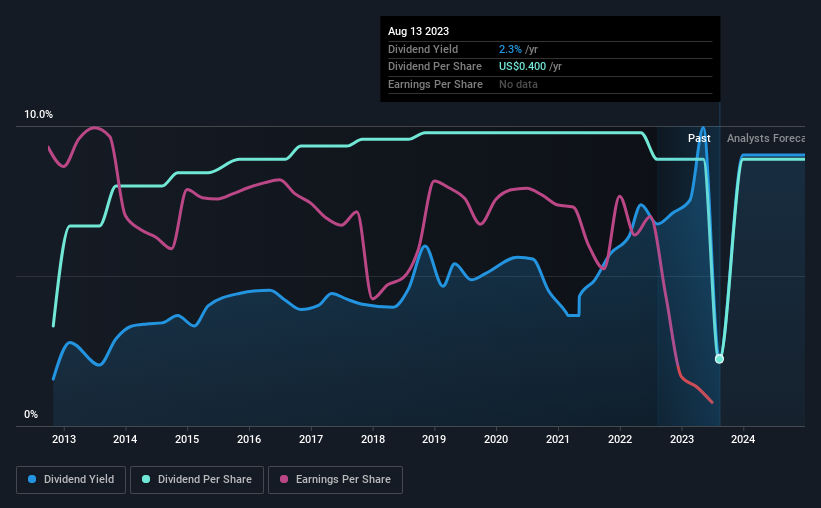- United States
- /
- Chemicals
- /
- NYSE:MATV
Mativ Holdings' (NYSE:MATV) Shareholders Will Receive A Smaller Dividend Than Last Year
Mativ Holdings, Inc. (NYSE:MATV) is reducing its dividend from last year's comparable payment to $0.10 on the 22nd of September. This means that the annual payment will be 2.3% of the current stock price, which is in line with the average for the industry.
Check out our latest analysis for Mativ Holdings
Mativ Holdings Doesn't Earn Enough To Cover Its Payments
We aren't too impressed by dividend yields unless they can be sustained over time. While Mativ Holdings is not profitable, it is paying out less than 75% of its free cash flow, which means that there is plenty left over for reinvestment into the business. This gives us some comfort about the level of the dividend payments.
Earnings per share is forecast to rise by 151.0% over the next year. If the dividend continues on its recent course, the company could be paying out several times what it earns in the next 12 months, which could start applying pressure to the balance sheet.

Dividend Volatility
While the company has been paying a dividend for a long time, it has cut the dividend at least once in the last 10 years. Since 2013, the dividend has gone from $0.60 total annually to $0.40. Doing the maths, this is a decline of about 4.0% per year. Declining dividends isn't generally what we look for as they can indicate that the company is running into some challenges.
The Dividend Has Limited Growth Potential
With a relatively unstable dividend, it's even more important to see if earnings per share is growing. Mativ Holdings' earnings per share has shrunk at 22% a year over the past five years. Such rapid declines definitely have the potential to constrain dividend payments if the trend continues into the future. It's not all bad news though, as the earnings are predicted to rise over the next 12 months - we would just be a bit cautious until this becomes a long term trend.
The Dividend Could Prove To Be Unreliable
Overall, it's not great to see that the dividend has been cut, but this might be explained by the payments being a bit high previously. The payments haven't been particularly stable and we don't see huge growth potential, but with the dividend well covered by cash flows it could prove to be reliable over the short term. We don't think Mativ Holdings is a great stock to add to your portfolio if income is your focus.
Companies possessing a stable dividend policy will likely enjoy greater investor interest than those suffering from a more inconsistent approach. At the same time, there are other factors our readers should be conscious of before pouring capital into a stock. For example, we've identified 2 warning signs for Mativ Holdings (1 shouldn't be ignored!) that you should be aware of before investing. If you are a dividend investor, you might also want to look at our curated list of high yield dividend stocks.
New: Manage All Your Stock Portfolios in One Place
We've created the ultimate portfolio companion for stock investors, and it's free.
• Connect an unlimited number of Portfolios and see your total in one currency
• Be alerted to new Warning Signs or Risks via email or mobile
• Track the Fair Value of your stocks
Have feedback on this article? Concerned about the content? Get in touch with us directly. Alternatively, email editorial-team (at) simplywallst.com.
This article by Simply Wall St is general in nature. We provide commentary based on historical data and analyst forecasts only using an unbiased methodology and our articles are not intended to be financial advice. It does not constitute a recommendation to buy or sell any stock, and does not take account of your objectives, or your financial situation. We aim to bring you long-term focused analysis driven by fundamental data. Note that our analysis may not factor in the latest price-sensitive company announcements or qualitative material. Simply Wall St has no position in any stocks mentioned.
About NYSE:MATV
Mativ Holdings
Manufactures and sells specialty materials in the United States, Europe, the Asia Pacific, the Americas, and internationally.
Undervalued with moderate growth potential.
Similar Companies
Market Insights
Community Narratives



